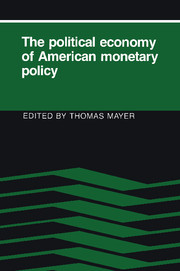Book contents
- Frontmatter
- Contents
- Preface
- List of contributors
- 1 Introduction
- 2 Studying the Fed: toward a broader public-choice perspective
- 3 The Federal Reserve reaction function: a specification search
- 4 Corporate profitability as a determinant of restrictive monetary policy: estimates for the postwar United States
- 5 Federal Reserve behavior since 1980: a financial-market perspective
- 6 The Federal Reserve and its institutional environment: a review
- 7 The political economy of monetary policy
- 8 Political monetary cycles
- 9 Congress and the Fed: why the dog does not bark in the night
- 10 The Federal Reserve as a political power
- 11 Monetary policy and political economy: the Federal Reserve and the Bank of Japan
- 12 A positive analysis of the policy-making process at the Federal Reserve
- 13 A theory of FOMC dissent voting with evidence from the time series
- 14 Explaining FOMC members' votes
- 15 Fed behavior and X-efficiency theory: toward a general framework
- 16 Minimizing regret: cognitive dissonance as an explanation of FOMC behavior
- 17 The discount window
- 18 Leaning against the wind: the behavior of the money stock in recession and recovery, 1953–8
- 19 Bureaucratic self-interest as an obstacle to monetary reform
- Index
10 - The Federal Reserve as a political power
Published online by Cambridge University Press: 06 July 2010
- Frontmatter
- Contents
- Preface
- List of contributors
- 1 Introduction
- 2 Studying the Fed: toward a broader public-choice perspective
- 3 The Federal Reserve reaction function: a specification search
- 4 Corporate profitability as a determinant of restrictive monetary policy: estimates for the postwar United States
- 5 Federal Reserve behavior since 1980: a financial-market perspective
- 6 The Federal Reserve and its institutional environment: a review
- 7 The political economy of monetary policy
- 8 Political monetary cycles
- 9 Congress and the Fed: why the dog does not bark in the night
- 10 The Federal Reserve as a political power
- 11 Monetary policy and political economy: the Federal Reserve and the Bank of Japan
- 12 A positive analysis of the policy-making process at the Federal Reserve
- 13 A theory of FOMC dissent voting with evidence from the time series
- 14 Explaining FOMC members' votes
- 15 Fed behavior and X-efficiency theory: toward a general framework
- 16 Minimizing regret: cognitive dissonance as an explanation of FOMC behavior
- 17 The discount window
- 18 Leaning against the wind: the behavior of the money stock in recession and recovery, 1953–8
- 19 Bureaucratic self-interest as an obstacle to monetary reform
- Index
Summary
There is growing awareness that political considerations play an important part in determining the Federal Reserve's monetary policy and regulatory actions. As a result, economists and political scientists are becoming increasingly interested in the Fed's political role. This chapter is concerned with how the Federal Reserve uses its regulatory functions, its role as lender of last resort, and other means to amass political power. It is argued that when these sources of political strength interact with the tremendous influence derived from being the agency of monetary policy, the Federal Reserve emerges as a formidable source of political power within the U.S. government. The Federal Reserve's position concerning expanded powers for banks is an example of how it works to increase its political power.
The Federal Reserve's political role
Studies of the Federal Reserve's political role are slowly accumulating, but the work is still at a rudimentary stage. Several chapters in this volume contribute to that literature, and they provide references to earlier studies. Some studies have attempted to show that the Federal Reserve's independence of Congress or the president is more apparent than real. For example, Kane, in this volume and elsewhere (Kane 1980, 1982), argues that Congress makes the Fed appear more independent than it really is by using the central bank as a scapegoat or whipping boy: Congress engages in “Fed-bashing” when it is politically desirable to do so. Other studies have documented instances in which the Federal Reserve's monetary policies were influenced by presidents or powerful members of Congress. Still others have pointed to principal-agent considerations to explain why the Fed at times can act independently of Congress.
- Type
- Chapter
- Information
- The Political Economy of American Monetary Policy , pp. 149 - 162Publisher: Cambridge University PressPrint publication year: 1990
- 2
- Cited by



